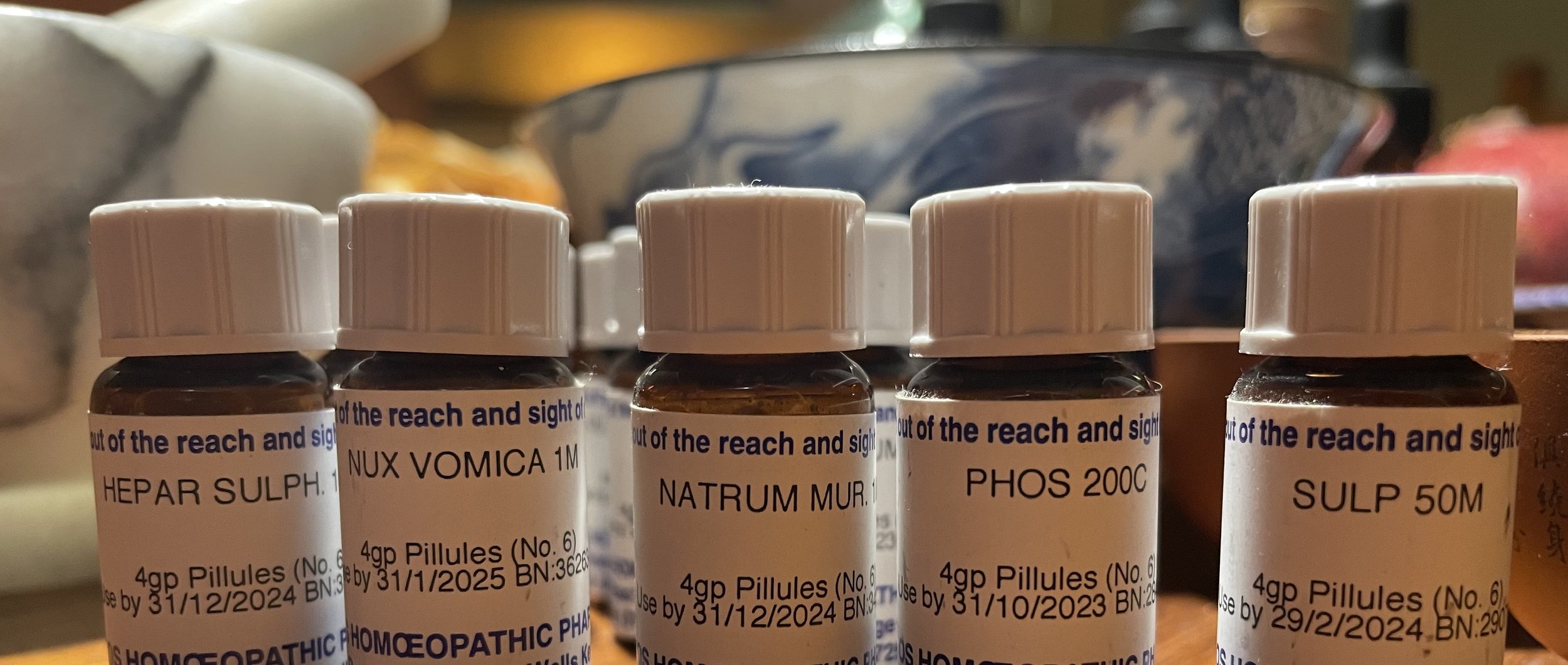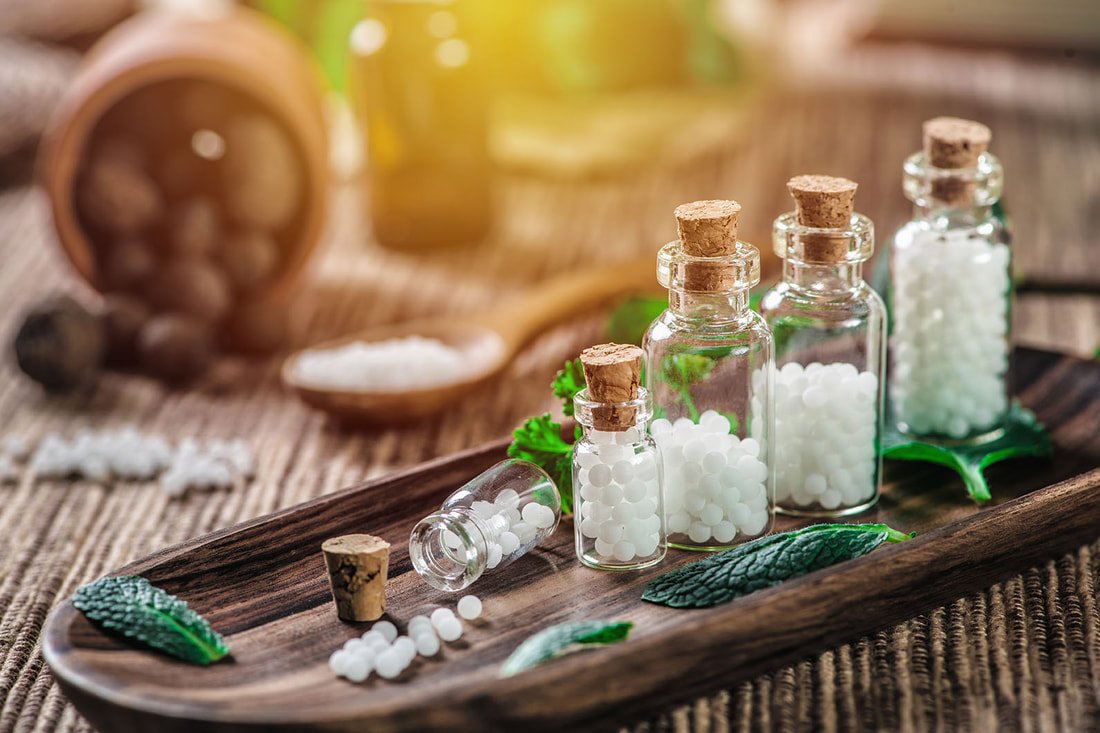
Classical Homeopathy
What is Classical Homeopathy and who can benefit?
Classical Homeopathy is an energetic system of healing that strengthens the immune system and stimulates a person's natural ability to correct an imbalance in the body and fight off disease. It is a gentle yet powerful modality for helping the body relieve symptoms, strengthen vitality and improve overall health to come back into balance naturally. It is essential to have a well-trained classical homeopath to support the return of optimal health to your body and clear out disease states that may be present. The focus is on a person's whole constitution, and all symptoms are taken into consideration. One remedy is chosen at a time to support and respect the innate intelligence and deep healing abilities of your body.
Classical Homeopathy can aid in treating a variety of symptoms found in both acute and chronic conditions and is completely safe for newborns, infants, both younger and older children, teens, adults, pregnant and breastfeeding moms, as well as the elderly.

“Homeopathy, or Homeopathic Medicine, is the practice of medicine that embraces a holistic, natural approach to the treatment of the sick. Homeopathy is holistic because it treats the person as a whole, rather than focusing on a diseased part or a labeled sickness. Homeopathy is natural because its remedies are produced according to the U.S. FDA-recognized Homeopathic Pharmacopoeia of the United States from natural sources, whether vegetable, mineral, or animal in nature.”
-American Institute of Homeopathy
What can homeopathy help with?
Acute conditions occur suddenly or quickly, last for a few hours or up to a few weeks, and result from a particular situation or event. Examples are: sprained or broken bone, cold and flu symptoms, food poisoning, nausea and vomiting, burns, bites, scrapes, or wounds.
Chronic conditions occur longer than a period of several weeks and can be existing for many years. They usually negatively affect a person’s quality of life and worsen over time.
Asthma, hay fever, allergies, dermatitis, eczema, hives, acne, rashes, psoriasis
ear infections, tinnitus, vertigo, nausea, diarrhea, constipation
respiratory infections, bronchitis, coughs
arthritis, chronic pain, gout, headaches, migraines
high blood pressure, chronic fatigue, insomnia, thyroid issues
gastrointestinal issues, metabolic problems, neurological issues, shingles
PMS, uterine and reproductive issues, hormonal issues, menopause
depression, stress, irritability, anxiety, grief, behavioral issues, autism, ADD/ADHD.
A well-chosen remedy can address acute and chronic symptoms to support the body’s innate defense system in resolving conditions.
What is a remedy?
Homeopathy was conceived in the 1700s by Samuel Hahnemann, a German physician who further developed the idea that by giving a sick person a very small dose of a substance that, in a healthy person would produce the same symptoms, amelioration of symptoms in the sick person would be produced. A “remedy” is carefully selected and given to the person based on the concept that “like cures like”. An example of “like cures like” is the use of the remedy Allium Cepa, made from the common onion. Because onions can cause nasal discharge and watery, runny eyes, this remedy is frequently given to someone who is experiencing similar hay fever-like symptoms with watery eyes and nasal discharge. By giving the body a minute amount of a substance that creates a similar reaction to what a person is already experiencing, this “little push” activates the defense system to mount a response and clear out the imbalance without harmful side effects.

“Natural forces within us are the true healers of disease.”
Hippocrates
How is a remedy made?
Remedies are prepared from a variety of mineral, plant, and animal substances in strictly regulated environments to ensure proper safety standards and quality control. The FDA approves and regulates the production of remedies that have to be prepared under strict guidelines in licensed laboratories. In Classical Homeopathy, only one remedy is given at a time and then followed by close observation and assessment, in order to provide the best healing result. Remedies are usually given in liquid form or as a small pellet or tablet. In order to create an effective remedy, a very small amount of a substance is repeatedly diluted and succussed. Succussing requires repeated and vigorous shaking along with a forceful impact on a firm surface. This process creates an “energized” remedy that is manufactured into a variety of strengths, depending on the number of rounds of dilution and succussion. The more dilution and succussion of a remedy, the higher the potency or strength.

“The highest ideal of cure is rapid, gentle, and permanent restoration of health in the shortest, most reliable, and most harmless way.”
Samuel Hahnemann
Why consult a Classical Homeopath?
A well-trained Classical Homeopath will be highly skilled in finding the correct remedy for your particular symptoms. There are thousands of remedies and a homeopath with proper training will perform a very thorough case analysis by inquiring about your current symptoms, complaints and lifestyle, past medical history, as well as your internal state, in order to determine what remedy and course of treatment are best for you. Understanding the complete physical, emotional and mental picture of a person is essential in order to give you the very best care. Classical homeopaths will also only give you one remedy at a time, in order to maintain a clear picture of what is happening as your symptoms shift and the healing process is underway. This is an essential aspect of the process, as multiple remedies at the same time, can quickly confuse the picture.

